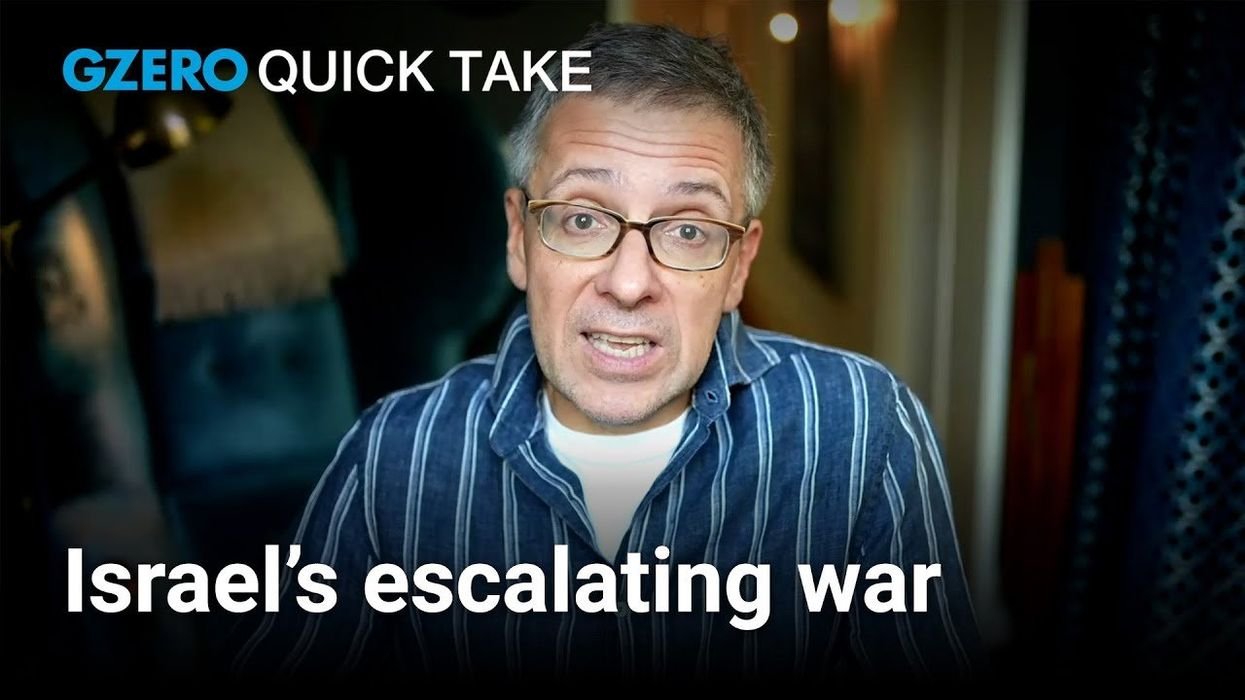Ian Bremmer’s Quick Look: A quick look to start your week. It’s everything everywhere all the time in terms of geopolitical risks in the environment right now. Pretty much everywhere you look, we have increasing conflict. But the Middle East still takes up more of my time than most things. This is partly because we are waiting for what kind of Israeli response to these Iranian attacks. The 180 ballistic missiles launched towards and from Israel two weeks ago, at the same time as the war in Lebanon between Israel and Hezbollah continues. Maybe we’ll start with the Iranian side. The big news now is some information from the Americans. First, the United States will send the THAAD missile defense system, along with 100 American soldiers, to operate it in Israel to improve Israel’s air defenses against attacks coming from outside the country.
Second, the US Treasury Department announced additional sanctions on tankers that shut down their transponders and are helping Iranians illegally export large quantities of sanctions-violating oil. Prices could rise as a result of this. This is an unusual thing for Americans to do a few weeks before the election, but it shows how concerned they are about potential escalation in the region. So let me give you some context here. First point. On the one hand, the Americans have sent THAAD systems to Israel before. So, it’s not as if there aren’t any American soldiers on the ground working in Israel. This isn’t like a game changer. In fact, such a decision was not only made years ago, but also after October 7th. But it is worth noting that it comes a year later against the backdrop of a potentially major escalation, both on the northern front that we are already seeing and with Iran that we may see.
The second point is that oil prices are still just under $80. OPEC has plenty of spare capacity it can put on the market. China is still experiencing very poor numbers in terms of demand. So this is unlikely to lead to a US move to strike more Iranian oil, and is unlikely to have a significant impact in terms of oil prices. But if the Americans could have stopped what is now 1.5 million barrels of Iranian exports, if they could have stopped that, and the Iranians were using that money to pay the price for the axis of resistance that is not only targeting Israel, but targeting ships in the Middle East. And targeting American and British military assets. Why did Biden wait? Why was it announced only now? And why is it being announced only now in a way that appears to be a way for the Israeli Prime Minister and his government to not engage in a major retaliatory escalation against the Iranians?
This is a US policy that still appears very weak, and is still far from most of its allies at this point. You see even French President Macron saying that he does not want to provide more military support to Israel. Of course, it’s easy for him to say that. It doesn’t offer much to begin with. If these were major exports, I’m sure Macron wouldn’t say so. But despite that, Americans are on one side and very isolated at this point compared to the rest of the international community, whether you like the United States or not. Their ability to influence the Israeli government appears to be almost non-existent. This was demonstrated in the recent attacks launched by the Israel Defense Forces against UN peacekeepers in Lebanon. And we’ve seen that, on the back of those attacks, the United States, France, Spain and Italy, which is a strong right-wing government, but also has a thousand peacekeepers on the ground in Lebanon, all strongly condemn the Israelis for carrying out these attacks.
But they are unwilling to actually do anything in response, and certainly not make the Israelis feel they need to stop. Now the Israeli perspective is that these peacekeepers were not able to support the Security Council resolution requiring Hezbollah to withdraw from the border area, a buffer zone, where they were launching military strikes against Israel. Hezbollah fighters mainly use the presence of peacekeepers as shields. They do not work in peacekeeping force bases, but rather close to them, which makes it difficult for the Israelis to pursue them. This certainly does not justify shooting directly at the peacekeepers’ base, which is what happened and which the Israeli military now says was a mistake. In return, the Israeli Prime Minister called on the Secretary-General of the United Nations to withdraw peacekeeping forces. I find it unbelievable that the Israeli Prime Minister does not realize that the Secretary-General does not in fact have any authority over peacekeeping forces.
They were sent there on the basis of the Security Council. In other words, if the Israeli prime minister wanted to make a request, he would ask permanent members of the Security Council such as the United States, China, France, the United Kingdom, and Russia. It seems that he does not want to make this statement. But again, the point here is relative impunity, and the headlines, of course, in the last 24 hours, are about four Israeli soldiers being targeted and killed, as well as a large number of casualties on Israeli military bases by Hezbollah drones. Hezbollah has become much more capable than Hamas, and there will be greater Israeli losses as this war continues. But most of the casualties, of course, although it does not make most of the headlines, will be among the Lebanese, among Hezbollah fighters, and among the civilian population of Lebanon, of whom we have seen about 2,000 dead so far.
This is because military dominance in the region, again, offense, defence, intelligence and surveillance, is largely in Israel’s hands. So, if there is a major escalation in the next war, this escalation will be decided by the Israeli government by an overwhelming majority. This is what will be particularly interesting in the coming weeks. Frankly, I don’t expect much against Iran. The fact that the Israelis have already been waiting for a few weeks requires a lot of urgency. The fact that Defense Minister Yoav Galant said, “This will be the time we choose and what we do, they will know it’s us, but they won’t know how we did it,” means something. It’s a much more targeted attack than lots and lots of bombs raining down on, you know, Some type of nuclear facility or against oil production.
I would not be surprised if it was a high-level assassination, for example, of the Islamic Revolutionary Guard Corps. Especially because we have already seen that when the Trump administration assassinated Qassem Soleimani, the Iranian response was not practical. So, there’s precedent for that, and the Iranians at this point have very little they can do that won’t hurt them much more than they could hurt Israel or Israel’s allies. So this is where we are now. A war that continues to escalate with much suffering. US policy is incredibly ineffective in the region, and everyone is pretty much sitting on the sidelines.











